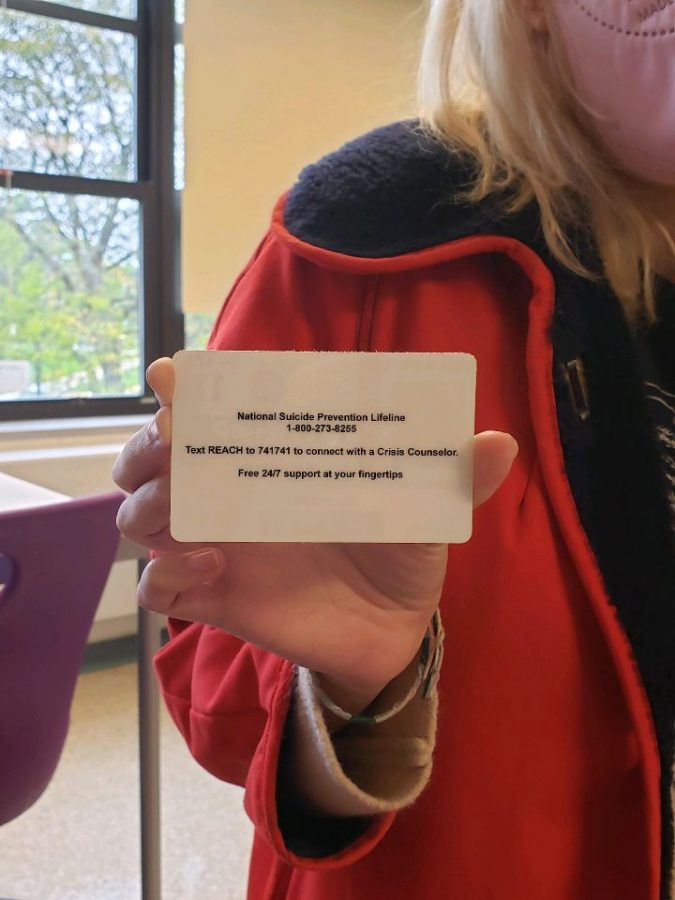Students weigh in on new suicide hotline number on school IDs
For some, it’s a superficial approach to a serious issue. For others, it’s a welcome bit of attention towards an issue they care about. But for all students, it came as a surprise to see the toll-free number for the suicide hotline on the back of their school ID cards this year.
“I think that it’s a useful and necessary tool for some people, but it’s also a symbol of our school’s instability,” said junior Michael Tracey. “I don’t know if it’s a good or bad thing. I’m glad it’s there, but the fact that it’s there signifies that there is a deeper problem.”
IDs issued for the 2021-22 school year now contain the toll-free number, 1-800-273-8255, of the National Suicide Prevention Lifeline on the back of each card for all middle and high school students in the Ann Arbor Public Schools.
Mental health crises and suicides in teens have been up since before the beginning of the COVID-19 pandemic in late December 2019. A June 2021 study published by the U.S. Centers for Disease Control indicated that mental health-related emergency room visits were up 31% compared to the year before. Proponents of the ID card decision would point to that stark increase and say that it is a needed response. And just last month, UNICEF in its “State of the World’s Children” report found that 13% of children worldwide between ages 13 and 19 have a diagnosed mental health disorder, with anxiety and depression constituting the largest share at 40%.
Marisa Jordan Galarza, also a junior, is a firm proponent of the measure. “I think it’s a great idea,” said Galarza. “I know that people in my own family have benefited from the suicide hotline. You could never have it on enough surfaces. It doesn’t matter if some people think it’s strange or would never use it. If it helps one person, it’s all that matters.”
Pioneer school nurse Lauren Huissen agrees. While Huissen was not directly involved in the planning process for this initiative, she said that adding the number is a step in the right direction.
“It’s obviously a prevalent issue with teens, so I think the more awareness we can draw to (the issue) and having that number on the back of an ID card is helpful,”said Huissen. “If you’re put into that situation supporting a student, or you yourself are having suicidal thoughts or feelings, I think it could make a difference. A lot of kids probably don’t know what the suicide hotline number is, or that there even is one, so the more emphasis we can put on getting that number out is helpful.”
On the contrary, Fernanda Marcelo, also a senior at Pioneer, says that the move seems half-hearted and unhelpful. “It seems (the administration is) doing things quietly instead of actively telling students that there are other things available to them, including their counselors,” she said. “I think it’s something very good, but it doesn’t seem like a very strong effort to point students towards the right direction, especially because there was no mention of student support groups like Positive Peer Influence.”
Reactions are not limited to Pioneer students. Sabrina DeMonner, a sophomore at Community, said the suicide hotline should be a last resort in combating suicide, and that district efforts should focus on more consistent help.
“If (the district) really cared more, they would do something else other than this little thing on the back of our cards,” said DeMonner. “Though I do feel that the measure had good intentions and that it’s a nice gesture, the district should put more effort into advertising support groups or safe places. I feel like students want something before that hotline of last resort, something less freaked-out.”
Tracey added that there is a serious mental health problem at the school which the new ID cards just don’t solve. “The failing mental health of the majority of the student body is the problem here,” said Tracey. “Seeing the suicide hotline on the back of our ID cards is a sign that it’s time for change and that students need to get what they need.”
If you or someone you know are dealing with suicidal thoughts, please call the National Suicide Prevention Lifeline at 1-800-273-8255.


